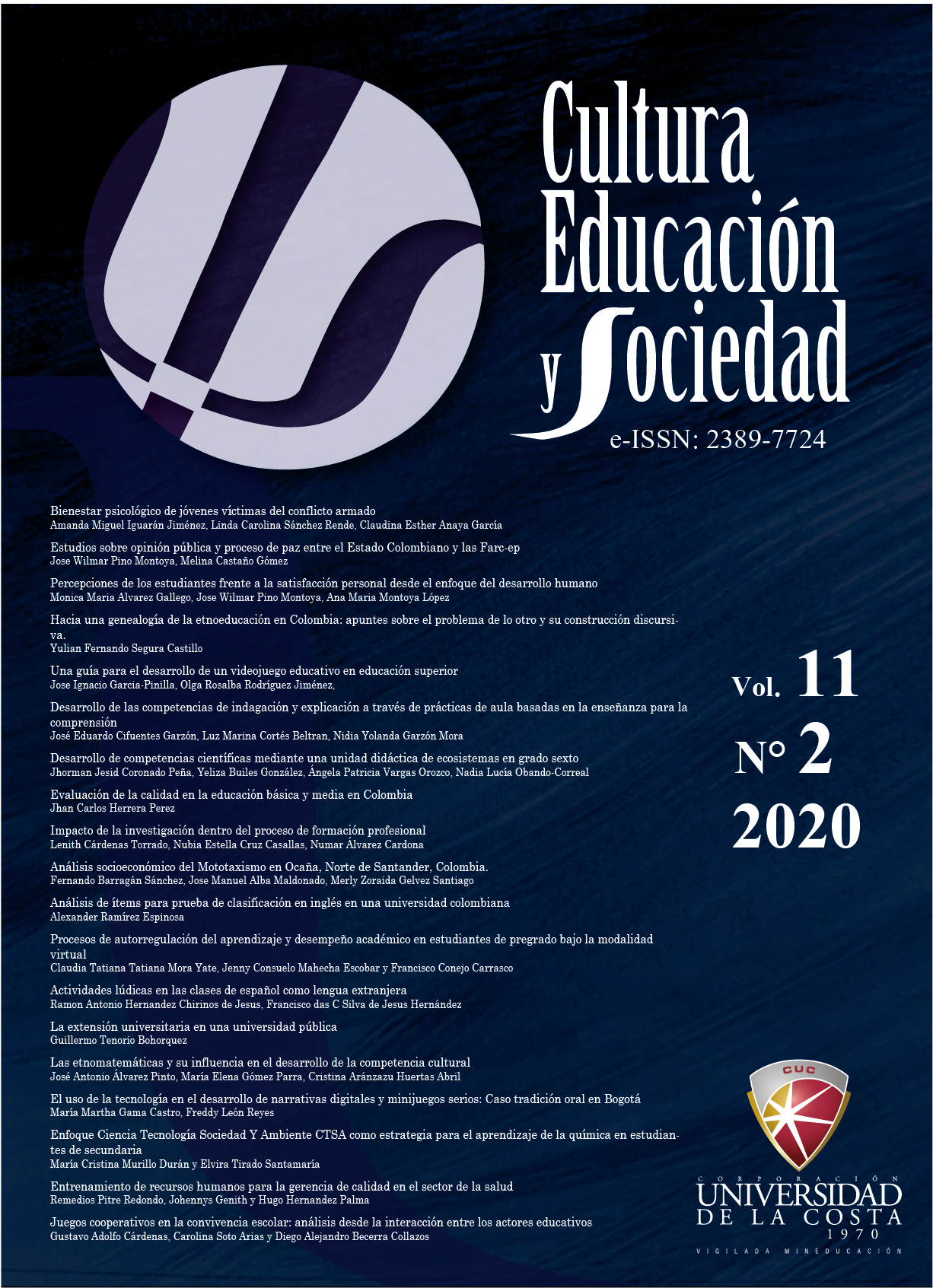Playful activities in spanish as a foreign language classes
DOI:
https://doi.org/10.17981/cultedusoc.11.2.2020.13Keywords:
Leisure activities, Spanish as a foreign language, Pedagogical strategies, Teaching and learning spanishAbstract
The present work is the result of an investigation carried out with the students of the first, second and third year of Secondary School in the Municipal School "Popular Remédiense" located in the Municipality of Our Mrs. of Los Remedios-Piauí. In this case, recreational and recreational activities were applied in Spanish classes. It gave rise to the following question: How can the Spanish language improve with the use of recreational and recreational activities in the classroom? The purpose of the research was to apply a series of recreational and recreational activities in the different meetings with the students. The study was theoretically supported by the following authors: Santos (2006), Teixeira (1995), Albuquerque (2003), among others. This study is justified from the academic point of view because it allowed other teachers to implement the strategies in other disciplines. Regarding the methodology, the nature of the study is applied with a quantitative approach, the objective of the research is descriptive and the procedure is field. It was found that the use of recreational and recreational activities in Spanish language classes allowed different social actors to acquire socialized content in an easier and more meaningful way, demonstrating the interest in self-esteem in participating, creating a relaxed and friendly atmosphere , resulting in better learning.
Downloads
References
Ascorra, P., Vásquez, P., Passalacqua, N., Carrasco, C., López, V., Núñez, C. y Álvarez, M. (2017). Discursos en torno a la administración del conflicto y su relación con la convivencia escolar. Cultura Educación y Sociedad, 8(2), 21–42. https://doi.org/10.17981/cultedusoc.8.2.2017.02
Calderón, L., Marín, S. y Vargas, N. (2015). La lúdica como estrategia para favorecer el proceso de aprendizaje en niños de edad preescolar de la institución educativa Nusefa de Ibagué. [Trabajo grado]. Universidad del Tolima, Colombia. Disponible en http://repository.ut.edu.co/handle/001/1409
Castellar, G., Gonzalez, S. y Santana, Y. (2015). Las actividades lúdicas en el proceso de enseñanza aprendizaje de los niños de preescolar del instituto madre teresa de Calcuta. [Trabajo grado]. Universidad del Tolima, Colombia. Disponible en https://repositorio.unicartagena.edu.co/handle/11227/2106
Díaz, L. (2010). La lúdica como estrategia de aprendizaje en el desarrollo de habilidades del inglés en niños y niñas de grado PBP. [Tesis magistral]. UNAM, Colombia. Recuperado de http://www.bdigital.unal.edu.co/41019/1/04868267.2014.pdf
Duarte, D. (2003). Ambientes de aprendizaje: una aproximación conceptual. Estudios pedagógicos (Valdivia), (29), 97–113. https://dx.doi.org/10.4067/S0718-07052003000100007.
Guerrero, R. (2014). Estrategias lúdicas: herramienta de innovación en el desarrollo de las habilidades numéricas. Revista Electrónica de Humanidades, Educación y Comunicación Social, 18(9), 30–43. Disponible en http://ojs.urbe.edu/index.php/redhecs/article/view/2427
Morín, E. (1999). Los siete saberes para la educación del futuro. Francia: Unesco.
Pérez, G. (1994). Investigación cualitativa. Retos e interrogantes. Madrid: La Muralla.
Posada, R. (2014). La lúdica como estrategia didáctica. [Tesis magistral]. UNAM, Bogotá, D.C. Recuperado de http://www.bdigital.unal.edu.co/41019/1/04868267.2014.pdf
Sánchez, G. (2010). Las estrategias de aprendizaje a través del componente lúdico. Marco ELE: Revista de Didáctica Español Lengua Extranjera, (11), 1–68. Disponible en https://marcoele.com/suplementos/estrategias-y-componente-ludico/
Santos, S. (2006). Educação, arte e jogo. Petrópolis: Vozes.
Santos. S. (1997). Lúdico na Formação do Educador. Petrópolis-RJ: Vozes.
Silveira, R. & Barone, D. (1998). Jogos Educativos computadorizados utilizando a abordagem de algoritmos genéticos. Sao Paulo: Universidade Federal do Rio Grande do Sul.
Tamayo, M. (1995). El proceso de la investigación científica. (3 Ed.). México, D.F.: Limusa.
Teixeira, C. (1995). Ludicidade na Escola. São Paulo: Loyola.
Zúñiga, G. (noviembre, 1998). La pedagogía lúdica: una opción para comprender. En, FUNLIBRE, V Congreso Nacional de Recreación. Coldeportes Caldas, Universidad de Caldas, FUNLIBRE, Manizales, Caldas, Colombia.
Published
How to Cite
Issue
Section
License
Copyright (c) 2022 CULTURA EDUCACIÓN Y SOCIEDAD

This work is licensed under a Creative Commons Attribution-NonCommercial-NoDerivatives 4.0 International License.
![]()
Creative Commons 2020 CULTURA EDUCACIÓN Y SOCIEDAD
This article is under international license Creative Commons Reconocimiento-NoComercial-SinObrasDerivadas 4.0.
The published articles are the sole responsibility of their authors and do not necessarily reflect the opinions of the editorial committee.
CULTURA EDUCACIÓN Y SOCIEDAD respects the moral rights of its authors, who assign to the editorial committee the patrimonial rights of the published material. In turn, the authors inform that this work is unpublished and has not been previously published.
All articles are under a:
Licencia Creative Commons Atribución-NoComercial-SinDerivadas 4.0 Internacional.
![]()


 English
English
 Español (España)
Español (España)




_12.53_.27_p_. m_._3.png)





_12.57_.35_p_. m_._3.png)
_12.50_.37_p_. m_._3.png)



